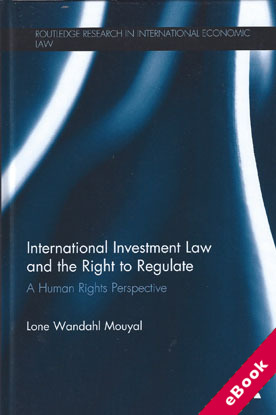
The device(s) you use to access the eBook content must be authorized with an Adobe ID before you download the product otherwise it will fail to register correctly.
For further information see https://www.wildy.com/ebook-formats
Once the order is confirmed an automated e-mail will be sent to you to allow you to download the eBook.
All eBooks are supplied firm sale and cannot be returned. If you believe there is a fault with your eBook then contact us on ebooks@wildy.com and we will help in resolving the issue. This does not affect your statutory rights.
The book considers the ways in which the international investment law regime intersects with the human rights regime, and the potential for clashes between the two legal orders.
Within the human rights regime states may be obligated to regulate, including a duty to adopt regulation aiming at improving social standards and conditions of living for their population. Yet, states are increasingly confronted with the consequences of such regulation in investment disputes, where investors seek to challenge regulatory interferences for example in expropriation claims.
Regulatory measures may for instance interfere with the investment by imposing conditions on investors or negatively affecting the value of the investment. As a consequence, investors increasingly seek to challenge regulatory measures in international investment arbitration on the basis of a bilateral investment treaty.
This book sets out the nature and the scope of the right to regulate in current international investment law. The book examines bilateral investment treaties and ICSID arbitrations looking at the indicative parameters that are granted weight in practice in expropriation claims delimiting compensable from non-compensable regulation.
The book places the potential clash between the right to regulate and international investment law within a theoretical framework which describes the stability-flexibility dilemma currently inherent within international law. Lone Wandahl Mouyal goes on to set out methods which could be employed by both BIT-negotiators and adjudicators of investment disputes, allowing states to exercise their right to regulate while at the same time providing investors with legal certainty.